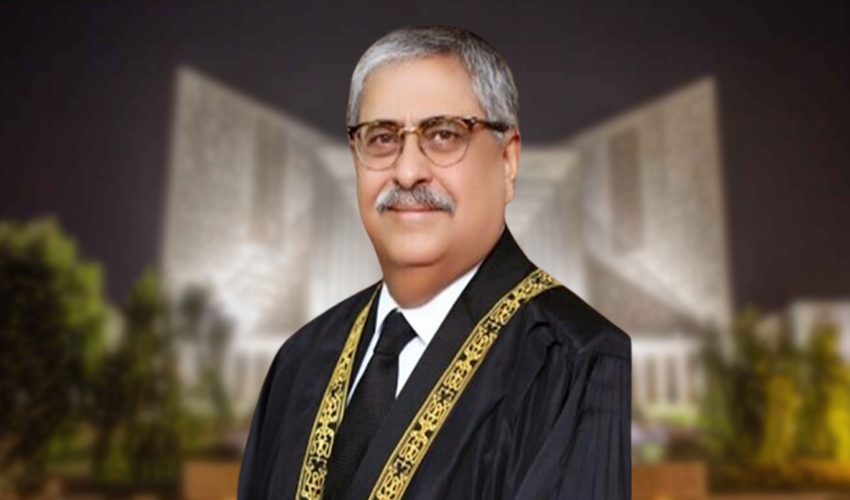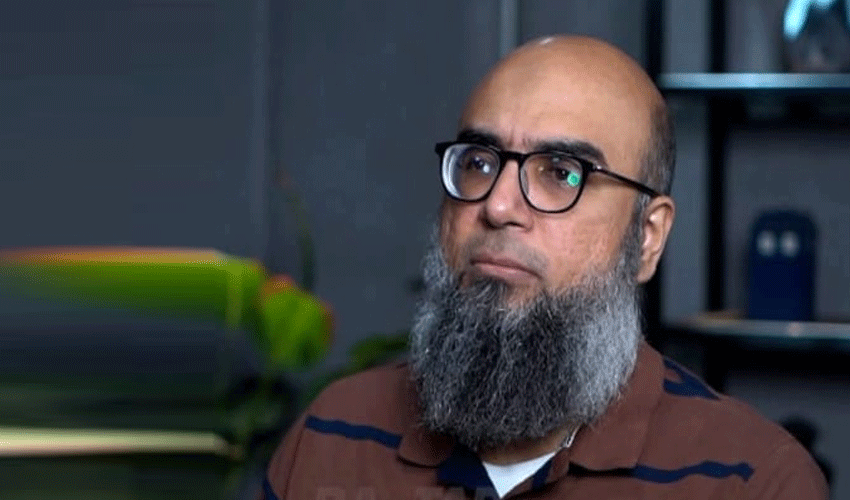The Supreme Court has issued the dissenting note of Justice Athar Minallah in the lives-streaming plea of the PTI founder Imran Khan which was rejected by the SC bench, in the NAB amendments case.
Justice Minallah said SC had declared access of the public to the court proceedings in all cases in matters of public importance through live streaming as a recognised fundamental right guaranteed under Article 19-A of the Constitution.
'Imran undisputed leader of major political party'
Justice Minallah in his dissenting note said: "The respondent, Imran Ahmed Khan Niazi (‘respondent’), is the founder and undisputed leader of a major political party, Pakistan Tehrik-e-Insaaf. The respondent, who at present is incarcerated in the Central Prison, Adiala had challenged the vires of the amendments brought about in the National Accountability Ordinance, 1999 (‘Ordinance of 1999’).
"The distinguished human rights defender and journalist, late I.A Rehman, in one of his publications had referred to a fact sheet 5 NAB versus human rights, Dawn October 15, 2020) 10 CMA 5172/24 in ICA 2/2023 prepared by a parliamentarian, highlighting twelve deaths for which the Bureau was held responsible.
"The former Prime Minister, Mohtarma Benazir Bhutto Shaheed and her husband Asif Ali Zardari, who is the current President of the Islamic Republic of Pakistan, were acquitted by this Court because it was declared that the trial was not fair on account of the bias of the judges on the Ehtesab Branch.
"The powers of the Bureau were subsequently used to prosecute, humiliate and violate the dignity of other former Prime Ministers, Mian Mohammad Nawaz Sharif, Shahid Khaqan Abbasi, Yousaf Raza Gillani etc.
It is ironic that at present the respondent has fallen a victim after his removal from the office of Prime Minister.
"The perception that the establishment and complicit courts are responsible for such grave abuses of human rights and humiliation of the representatives of the people does not appear to be unfounded."
Zufiqar Ali Bhutto case reference
Justice Ather said: "When the deposed Prime Minister Zufiqar Ali Bhutto was arrested and sent to the gallows by this Court he was not an ordinary prisoner or convict. He was a victim of the coercive apparatus of the State imposed by a uniformed usurper, who was purportedly given legitimacy by this Court.
"Likewise, Benazir Bhutto Shaheed and Mian Mohammad Nawaz Sharif were made to profoundly suffer on account of the grave abuse of the powers vested in the Bureau. They were not ordinary prisoners and convicts because their persecutions were perceived to be motivated.
"They had millions of followers and the perception that, as representatives of the people, they were being humiliated and harassed for other than bona fide reasons on the basis of alleged corruption and corrupt practices at the behest of unelected office holders was not without substance.
"It is ironic that yet another elected former Prime Minister, the respondent, is incarcerated today and facing multiple trials, some having ended in convictions and also 9 Dawn November 24, 2022 12 CMA 5172/24 in ICA 2/2023 set aside by appellate forums.
"The respondent, like other former elected Prime Ministers, has millions of followers across the country as has become evident from the results of the last general elections. He is definitely not an ordinary prisoner or convict.
"The perception of the existence of a coercive apparatus of the State cannot be ignored by a constitutional court, particularly having regard to the unjustified treatment of representatives of the people in the past. The perception of complicity of this Court in or by allowing the elected representatives to be humiliated, harassed and persecuted for other than bona fide reasons is not unfounded.
"This Court, after more than four decades, has recently attempted to remedy the grave wrong done in denying an elected Prime Minster, Zulfiqar Ali Bhutto, the right to a fair trial but regrettably the damage was irretrievable."
Chequered history
The chequered history and role of this Court in relation to the treatment of elected representatives has remained unflattering. The approach of this Court, therefore, should be to err in favour of the millions of followers and their representatives now, lest attempts be made after decades to remove an irretrievable blemish.
The last seventy six years of treatment of elected representatives leaves no other choice for a constitutional court but to exercise discretion in favour of caution. The Courts and the judges can no more bury their heads in the sand by ignoring the obvious realities. The reported restrictions on freedom of expression are manifest from the fact that censorship has been imposed on court reporting as well.
The existence of the coercive apparatus of the State is also manifest from the reported grave abuses of powers and the consequent infringement of the guaranteed rights.
In this background, it becomes inevitable for this Court to walk the extra mile to ensure transparency and enforcement of the guaranteed right under Article 19-A of the Constitution by giving access to the public to the court proceedings 13 CMA 5172/24 in ICA 2/2023 through live streaming.
Denial of access will unjustifiably give rise to suspicions and erode the confidence of the people in this Court.
It is an obligation for this Court to be seen as impartial, fair and independent and to dispel any perception to the contrary. The trust of the people will be maintained and promoted by enabling them to know and see for themselves the court proceedings.
'Substantive reason nor exceptional circumstances'
There is no substantive reason nor exceptional circumstances exist for denying the public their right to have access to the Court proceedings through live streaming. In the circumstances, denial of this guaranteed right will amount to violating the principles laid down in the Justice Qazi Faez Isa case, as highlighted above.
The above are the reasons for allowing the application and ordering access to the public to the proceedings in the case in hand through live streaming.



























